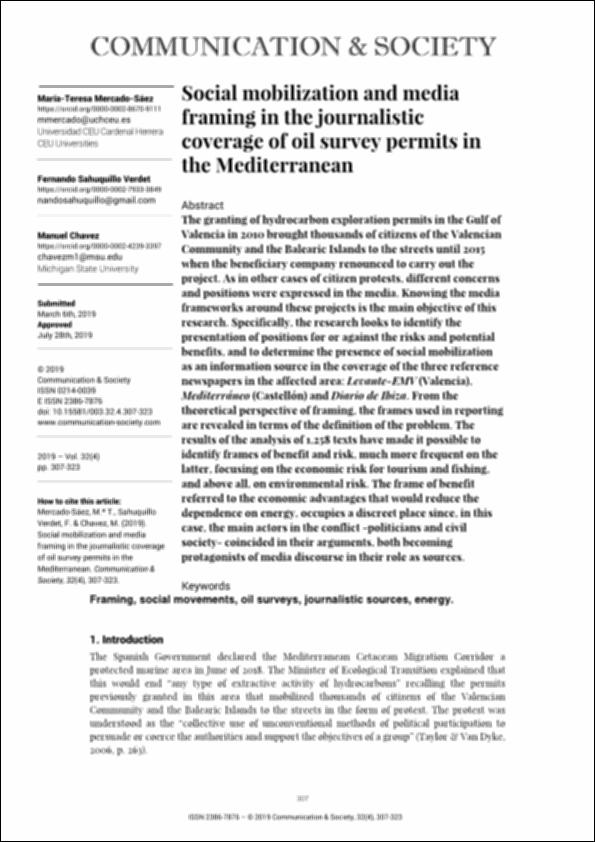Please use this identifier to cite or link to this item:
http://hdl.handle.net/10637/10774Social mobilization and media framing in the journalistic coverage of oil survey permits in the Mediterranean
| Title: | Social mobilization and media framing in the journalistic coverage of oil survey permits in the Mediterranean |
| Authors : | Mercado Sáez, María Teresa. Sahuquillo Verdet, Fernando Rafael Chávez Márquez, Manuel |
| Keywords: | Periodismo medioambiental - España.; Prensa - Análisis de contenido - España.; Periódicos - Análisis de contenido - Argentina.; Mass media and the environment - Spain.; Newspapers - Content analysis - Spain.; Oil fields - Spain - Balearics.; Petróleo - Yacimientos - España - Comunidad Valenciana.; Oil fields - Spain - Valencia (Autonomous Community); Petróleo - Yacimientos - España - Baleares (Comunidad Autónoma); Press - Content analysis - Spain. |
| Publisher: | Universidad de Navarra |
| Citation: | Mercado-Sáez, MT., Sahuquillo Verdet, F. & Chavez, M. (2019). Social mobilization and media framing in the journalistic coverage of oil survey permits in the Mediterranean. Communication & Society, vol. 32, n. 4, pp. 307-323. DOI: https://doi.org/10.15581/003.32.4.307-323 |
| Abstract: | The granting of hydrocarbon exploration permits in the Gulf of Valencia in 2010 brought thousands of citizens of the Valencian Community and the Balearic Islands to the streets until 2015 when the beneficiary company renounced to carry out the project. As in other cases of citizen protests, different concerns and positions were expressed in the media. Knowing the media frameworks around these projects is the main objective of this research. Specifically, the research looks to identify the presentation of positions for or against the risks and potential benefits, and to determine the presence of social mobilization as an information source in the coverage of the three reference newspapers in the affected area: Levante-EMV (Valencia), Mediterráneo (Castellón) and Diario de Ibiza. From the theoretical perspective of framing, the frames used in reporting are revealed in terms of the definition of the problem. The results of the analysis of 1,258 texts have made it possible to identify frames of benefit and risk, much more frequent on the latter, focusing on the economic risk for tourism and fishing, and above all, on environmental risk. The frame of benefit referred to the economic advantages that would reduce the dependence on energy, occupies a discreet place since, in this case, the main actors in the conflict -politicians and civil society- coincided in their arguments, both becoming protagonists of media discourse in their role as sources. |
| Description: | Este artículo se encuentra disponible en la página web de la revista en la siguiente URL: https://www.unav.edu/publicaciones/revistas/index.php/communication-and-society/article/view/36588/32767 Este artículo pertenece al número especial "Activism, Communication and Social Change in the Digital Age". |
| URI: | http://hdl.handle.net/10637/10774 |
| Rights : | http://creativecommons.org/licenses/by-nc-nd/4.0/deed.es |
| ISSN: | 0214-0039 2386-7876 (Electrónico) |
| Issue Date: | 7-Nov-2019 |
| Center : | Universidad Cardenal Herrera-CEU |
| Appears in Collections: | Dpto. Comunicación e Información Periodística |
Items in DSpace are protected by copyright, with all rights reserved, unless otherwise indicated.


